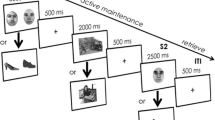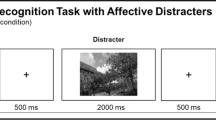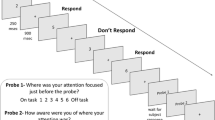Abstract
Attention and working memory are at risk of degradation over intensive intervals in groups engaged in highly demanding jobs. Accordingly, there is great interest in identifying training regimes to promote cognitive resilience in such populations. Herein, US Army Soldiers were assigned to either an 8-week, 16-h mindfulness training (MT) program (n = 40) or to a well-matched active comparison program involving positivity training (PT, n = 40), during an intensive interval of predeployment training. Working memory (WM) and sustained attention task performance, as well as self-reported positive and negative trait affect, were assessed at study onset (T1) and at the end of the MT/PT program interval (T2). Positive and negative trait affect did not change over time or differ across training groups. Yet, overall decline in cognitive task performance was observed from T1 to T2. Importantly, the MT group demonstrated significantly less decline in cognitive task performance relative to the PT group, suggesting better protection from cognitive degradation over time. Based on these results, we argue that MT should be further explored as a cognitive resilience-building tool in high-demand cohorts.



Similar content being viewed by others
Notes
Although it was not an outcome measure of central interest, we examined mean reaction time of correct trials for completeness. Response times for correct trials were slower over time, F(1, 66) = 5.80, p = .019, but did not differ among groups, F(1, 78) = 1.99, p = .162, and there was no significant interaction of time and group, F(1, 66) = 2.20, p = .142.
We also examined mean reaction time of correct non-target trials for completeness. Response times for non-target trials did not change over time, F(1, 63) = 2.16, p = .147, did not differ among groups, F(1, 77) = 0.01, p = .966, and there was no significant interaction of time and group, F(1, 63) = 2.27, p = .137.
References
Adler, A. B., Bliese, P. D., McGurk, D., Hoge, C. W., & Castro, C. A. (2009). Battlemind debriefing and battlemind training as early interventions with soldiers returning from Iraq: Randomization by platoon. Journal of Consulting and Clinical Psychology,77(5), 928–940. https://doi.org/10.1037/a0016877.
Algoe, S. B., & Fredrickson, B. L. (2011). Emotional fitness and the movement of affective science from lab to field. American Psychologist,66(1), 35–42. https://doi.org/10.1037/a0021720.
Allen, M., Dietz, M., Blair, K. S., van Beek, M., Rees, G., Vestergaard-Poulsen, P., et al. (2012). Cognitive-affective neural plasticity following active-controlled mindfulness intervention. Journal of Neuroscience,32(44), 15601–15610. https://doi.org/10.1523/JNEUROSCI.2957-12.2012.
Armijo-Olivo, S., Warren, S., & Magee, D. (2009). Intention to treat analysis, compliance, drop-outs and how to deal with missing data in clinical research: A review. Physical Therapy Reviews,14, 36–49. https://doi.org/10.1179/174328809X405928.
Bolton, E., Litz, B., Britt, T., Adler, A., & Roemer, L. (2001). Reports of prior exposure to potentially traumatic events and PTSD in troops poised for deployment. Journal of Traumatic Stress,14(1), 249–256.
Braswell, H., and Kushner, H. I. (2012). Suicide, social integration, and masculinity in the U.S. military. Social Science & Medicine, 74(4), 530–536. https://doi.org/10.1016/j.socscimed.2010.07.031.
Brewin, C. R., & Smart, L. (2005). Working memory capacity and suppression of intrusive thoughts. Journal of Behavior Therapy and Experimental Psychiatry,36(1), 61–68. https://doi.org/10.1016/j.jbtep.2004.11.006.
Chambers, R., Lo, B. C. Y., & Allen, N. B. (2008). The impact of intensive mindfulness training on attentional control, cognitive style, and affect. Cognitive Therapy and Research,32(3), 302–322. https://doi.org/10.1007/s10608-007-9119-0.
Creswell, J. D., Taren, A. A., Lindsay, E. K., Greco, C. M., Gianaros, P. J., Fairgrieve, A., et al. (2016). Alterations in resting-state functional connectivity link mindfulness meditation with reduced interleukin-6: A randomized controlled trial. Biological Psychiatry,80(1), 53–61. https://doi.org/10.1016/j.biopsych.2016.01.008.
deBettencourt, M. T., Keene, P. A., Awh, E., & Vogel, E. K. (2019). Real-time triggering reveals concurrent lapses of attention and working memory. Nature Human Behavior,3, 808–816. https://doi.org/10.1038/s41562-019-0606-6.
Denning, L. A., Meisnere, M., & Warner, K. E. (2014). Preventing psychological disorders in service-members and their families: An assessment of programs. Washington, DC: National Academies Press.https://doi.org/10.17226/18597.
Deuster, P. A., & Schoomaker, E. (2015). Mindfulness: A fundamental skill for performance sustainment and enhancement. Journal of Special Operations Medicine,15(1), 93–99.
Eidelson, R., & Soldz, S. (2012). Does comprehensive soldier fitness work: CSF research fails the test. Working paper number 1. Bala Cynwyd, PA : Coalition for an Ethical Psychology.
Fredrickson, B. L. (2009). Positivity: Groundbreaking research reveals how to embrace the hidden strength of positive emotions, overcome negativity, and thrive. New York: Crown Publishing Group.
Fredrickson, B. L., Cohn, M. A., Coffey, K. A., Pek, J., & Finkel, S. M. (2008). Open hearts build lives: Positive emotions, induced through loving-kindness meditation, build consequential personal resources. Journal of Personality and Social Psychology,95(5), 1045–1062. https://doi.org/10.1037/a0013262.
Gailliot, M. T., Schmeichel, B. J., & Baumeister, R. F. (2006). Self-regulatory processes defend against the threat of death: Effects of self-control depletion and trait self-control on thoughts and fears of dying. Journal of Personality and Social Psychology,91(1), 49–62. https://doi.org/10.1037/0022-3514.91.1.49.
Gupta, S. K. (2011). Intention-to-treat concept: A review. Perspectives in Clinical Research,2(3), 109–112. https://doi.org/10.4103/2229-3485.83221.
Haase, L., Thom, N. J., Shukla, A., Davenport, P. W., Simmons, A. N., Stanley, E. A., et al. (2016). Mindfulness-based training attenuates insula response to an aversive interoceptive challenge. Social Cognitive and Affective Neuroscience,11(1), 182–190. https://doi.org/10.1093/scan/nsu042.
Heatherton, T. F., & Wagner, D. D. (2011). Cognitive neuroscience of self-regulation failure. Trends in Cognitive Sciences,15(3), 132–139. https://doi.org/10.1016/j.tics.2010.12.005.
Hofmann, S. G., Sawyer, A. T., Witt, A. A., & Oh, D. (2010). The effect of mindfulness-based therapy on anxiety and depression: A meta-analytic review. Journal of Consulting and Clinical Psychology,78(2), 169–183. https://doi.org/10.1037/a0018555.
Hofmann, W., Schmeichel, B. J., & Baddeley, A. D. (2012). Executive functions and self-regulation. Trends in Cognitive Sciences,16(3), 174–180. https://doi.org/10.1016/j.tics.2012.01.006.
Jensen, C. G., Vangkilde, S., Frokjaer, V., & Hasselbalch, S. G. (2012). Mindfulness training affects attention—Or is it attentional effort? Journal of Experimental Psychology: General,141(1), 106–123. https://doi.org/10.1037/a0024931.
Jha, A. P. (2002). Tracking the time-course of attentional involvement in spatial working memory: An event-related potential investigation. Cognitive Brain Research,15(1), 61–69. https://doi.org/10.1016/s0926-6410(02)00216-1.
Jha, A. P., Krompinger, J., & Baime, M. J. (2007). Mindfulness training modifies subsystems of attention. Cognitive, Affective, & Behavioral Neuroscience,7(2), 109–119. https://doi.org/10.3758/CABN.7.2.109.
Jha, A. P., Stanley, E. A., Kiyonaga, A., Wong, L., & Gelfland, L. (2010). Examining the protective effects of mindfulness training on working memory and affective experience. Emotion,10(1), 54–64. https://doi.org/10.1037/a0018438.
Jha, A. P., Morrison, A. B., Dainer-Best, J., Parker, S. C., Rostrup, N., & Stanley, E. A. (2015). Minds “at attention”: Mindfulness training curbs attentional lapses in military cohorts. PLoS ONE,10(2), e0116889. https://doi.org/10.1371/journal.pone.0116889.
Jha, A. P., Morrison, A. B., Parker, S. C., & Stanley, E. A. (2016). Practice is protective: Mindfulness training promotes cognitive resilience in high-stress cohorts. Mindfulness,7(1), 1–13. https://doi.org/10.1007/s12671-015-0465-9.
Jha, A. P., Witkin, J. E., Morrison, A. B., Rostrup, N., & Stanley, E. (2017). Short-form mindfulness training protects against working memory degradation over high-demand intervals. Journal of Cognitive Enhancement,1(2), 154–171. https://doi.org/10.1007/s41465-017-0035-2.
Jha, A. P., Denkova, E., Zanesco, A. P., Witkin, J. E., Rooks, J., & Rogers, S. L. (2019). Does mindfulness training help working memory ‘work’ better? Current Opinion in Psychology,28, 273–278. https://doi.org/10.1016/j.copsyc.2019.02.012.
Johnson, D. C., Thom, N. J., Stanley, E. A., Haase, L., Simmons, A. N., Shih, P. A., et al. (2014). Modifying resilience mechanisms in at-risk individuals: A controlled study of mindfulness training in Marines preparing for deployment. American Journal of Psychiatry,171(8), 844–853. https://doi.org/10.1176/appi.ajp.2014.13040502.
Kabat-Zinn, J. (2013). Full catastrophe living (revised edition): Using the wisdom of your body and mind to face stress, pain, and illness. New York: Bantam Books.
Lakens, D. (2017). Equivalence tests: A practical primer for t tests, correlations, and meta-analyses. Social Psychological and Personality Science,8(4), 355–362. https://doi.org/10.1177/1948550617697177.
Larsen, K. L., & Stanley, E. A. (2018). Conclusion: the way forward. In K. Hendricks Thomas & D. Albright (Eds.), Bulletproofing the psyche: Preventing mental health problems in our military and veterans (pp. 233–253). Santa Barbara, CA: Praeger Books.
Larsen, K. L., & Stanley, E. A. (2019). Mindfulness-based mind fitness training: Mindfulness training for high-stress and trauma-sensitive contexts. In I. Ivtzan (Ed.), The handbook of mindfulness-based programs: Mindfulness interventions from education to health and therapy (pp. 53–63). New York: Routledge.
Leonard, N. R., Jha, A. P., Casarjian, B., Goolsarran, M., Garcia, C., Cleland, C. M., et al. (2013). Mindfulness training improves attentional task performance in incarcerated youth: A group randomized controlled intervention trial. Frontiers in Psychology,4, 792. https://doi.org/10.3389/fpsyg.2013.00792.
Lester, P. B., Harms, P. D., Herian, M. N., Krasikova, D. V., & Beal, S. J. (2011). The Comprehensive Soldier Fitness program evaluation. Report 3: Longitudinal analysis of the impact of Master Resilience Training on self-reported resilience and psychological health data. Retrieved January 8, 2020 from https://readyandresilient.army.mil/CSF2/supportdocs/TR3.pdf
Lieberman, H. R., Bathalon, G. P., Falco, C. M., Kramer, F. M., Morgan, C. A., & Niro, P. (2005). Severe decrements in cognition function and mood induced by sleep loss, heat, dehydration, and undernutrition during simulated combat. Biological Psychiatry,57(4), 422–429. https://doi.org/10.1016/j.biopsych.2004.11.014.
Lutz, A., Jha, A. P., Dunne, J. D., & Saron, C. D. (2015). Investigating the phenomenological matrix of mindfulness-related practices from a neurocognitive perspective. American Psychologist,70(7), 632–658. https://doi.org/10.1037/a0039585.
MacDonald, C., Chamberlain, K., Long, N., Pereira-Laird, J., & Mirfin, K. (1998). Mental health, physical health, and stressors reported by New Zealand Defense Force peacekeepers: A longitudinal study. Military Medicine,163(7), 477–481.
MacLean, K. A., Ferrer, E., Aichele, S. R., Bridwell, D. A., Zanesco, A. P., Jacobs, T. L., et al. (2010). Intensive meditation training improves perceptual discrimination and sustained attention. Psychological Science,21, 829–839. https://doi.org/10.1177/0956797610371339.
Marx, B. P., Doron-Lamarca, S., Proctor, S. P., & Vasterling, J. J. (2009). The influence of pre-deployment neurocognitive functioning on post-deployment PTSD symptom outcomes among Iraq-deployed Army soldiers. Journal of the International Neuropsychological Society,15(6), 840–852. https://doi.org/10.1017/S1355617709990488.
Meredith, L., Sherbourne, S., Gaillot, S., Hansell, L., Ritschard, H., Parker, A., et al. (2011). Promoting psychological resilience in the U.S. military. Santa Monica, CA: RAND Corporation.
Morey, R. A., Petty, C. M., Cooper, D. A., Labar, K. S., & McCarthy, G. (2008). Neural systems for executive and emotional processing are modulated by symptoms of posttraumatic stress disorder in Iraq War veterans. Psychiatry Research,162(1), 59–72. https://doi.org/10.1016/j.pscychresns.2007.07.007.
Morgan, C. A., Doran, A., Steffian, G., Hazlett, G., & Southwick, S. M. (2006). Stress-induced deficits in working memory and visuo-constructive abilities in special operations soldiers. Biological Psychiatry,60(7), 722–729. https://doi.org/10.1016/j.biopsych.2006.04.021.
Morrison, A. B., Goolsarran, M., Rogers, S. L., & Jha, A. P. (2014). Taming a wandering attention: Short-form mindfulness training in student cohorts. Frontiers in Human Neuroscience,7, 897. https://doi.org/10.3389/fnhum.2013.00897.
Mrazek, M. D., Franklin, M. S., Phillips, D. T., Baird, B., & Schooler, J. W. (2013). Mindfulness training improves working memory capacity and GRE performance while reducing mind wandering. Psychological Science,24(5), 776–781. https://doi.org/10.1177/0956797612459659.
Nassif, T. H., Start, A. R., Toblin, R. L., & Adler, A. B. (2018). Self-reported mindfulness and soldier health following a combat deployment. Psychological Trauma: Theory, Research, Practice, and Policy. https://doi.org/10.1037/tra0000413.
Ochsner, K. N., & Gross, J. J. (2005). The cognitive control of emotion. Trends in Cognitive Sciences,9(5), 242–249. https://doi.org/10.1016/j.tics.2005.03.010.
Ogden, P., & Fisher, J. (2015). Sensorimotor psychotherapy: Interventions for trauma and attachment. New York: W.W. Norton & Company.
Payne, P., Levine, P. A., & Crane-Godreau, M. A. (2015). Somatic experiencing: Using interoception and proprioception as core elements of trauma therapy. Frontiers in Psychology,6, 93. https://doi.org/10.3389/fpsyg.2015.00093.
Quach, D., Jastrowski Mano, K. E., & Alexander, K. (2016). A randomized controlled trial examining the effect of mindfulness meditation on working memory capacity in adolescents. Journal of Adolescent Health,58(5), 489–496. https://doi.org/10.1016/j.jadohealth.2015.09.024.
Robertson, I. H., Manly, T., Andrade, J., Baddeley, B. T., & Yiend, J. (1997). 'Oops!': Performance correlates of everyday attentional failures in traumatic brain injured and normal subjects. Neuropsychologia,35(6), 747–758. https://doi.org/10.1016/S0028-3932(97)00015-8.
Rooks, J. D., Morrison, A. B., Goolsarran, M., Rogers, S. L., & Jha, A. P. (2017). “We are talking about practice”: The influence of mindfulness vs. relaxation training on athletes’ attention and well-being over high-demand intervals. Journal of Cognitive Enhancement, 1(2), 141–153. https://doi.org/10.1007/s41465-017-0016-5.
Rosenkranz, M. A., Dunne, J. D., & Davidson, R. J. (2019). The next generation of mindfulness-based intervention research: What have we learned and where are we headed? Current Opinion in Psychology. https://doi.org/10.1016/j.copsyc.2018.12.022.
Rothschild, S., Kaplan, G., Golan, T., & Barak, Y. (2017). Mindfulness meditation in the Israel Defense Forces: Effect on cognition and satisfaction with life—A randomized controlled trial. European Journal of Integrative Medicine,10, 71–74. https://doi.org/10.1016/j.eujim.2017.01.010.
Schmeichel, B. J. (2007). Attention control, memory updating, and emotion regulation temporarily reduce the capacity for executive control. Journal of Experimental Psychology: General,136(2), 241–255. https://doi.org/10.1037/0096-3445.136.2.241.
Schulz, K. F., Altman, D. G., & Moher, D. (2010). CONSORT 2010 statement: updated guidelines for reporting parallel group randomised trials. BMC Medicine,8, 18. https://doi.org/10.1186/1741-7015-8-18.
Slagter, H. A., Davidson, R. J., & Lutz, A. (2011). Mental training as a tool in the neuroscientific study of brain and cognitive plasticity. Frontiers in Human Neuroscience,5, 17. https://doi.org/10.3389/fnhum.2011.00017.
Smith, S. L. (2013). Could comprehensive soldier fitness have iatrogenic consequences? A commentary. The Journal of Behavioral Health Services & Research,40(2), 242–246. https://doi.org/10.1007/s11414-012-9302-2.
Stanislaw, H., & Todorov, N. (1999). Calculation of signal detection theory measures. Behavior Research Methods, Instruments, & Computers,31(1), 137–149. https://doi.org/10.3758/BF03207704.
Stanley, E. A. (2014). Mindfulness-based Mind Fitness Training (MMFT): An approach for enhancing performance and building resilience in high-stress contexts. In C. T. N. A. Le & E. J. Langer (Eds.), The Wiley-Blackwell handbook of mindfulness (pp. 964–985). London: Wiley-Blackwell. https://doi.org/10.1002/9781118294895.ch50.
Stanley, E. A., & Larsen, K. L. (2018). Emotion dysregulation and military suicidality since 2001: A review of the literature. Political Psychology,40(1), 147–163. https://doi.org/10.1111/pops.12493.
Stanley, E. A., and Larsen, K. L. (2019). Difficulties with emotion regulation in the contemporary U.S. Armed Forces: Structural contributors and potential solutions. Armed Forces and Society. https://doi.org/10.1177/0095327X19848018.
Stanley, E. A., Schaldach, J. M., Kiyonaga, A., & Jha, A. P. (2011). Mindfulness-based mind fitness training: A case study of a high-stress predeployment military cohort. Cognitive and Behavioral Practice,18(4), 566–576. https://doi.org/10.1016/j.cbpra.2010.08.002.
Steenkamp, M. M., Nash, W. P., & Litz, B. T. (2013). Post-traumatic stress disorder: Review of the comprehensive soldier fitness program. American Journal of Preventive Medicine,44(5), 507–512. https://doi.org/10.1016/j.amepre.2013.01.013.
Tanielan, T., & Jaycox, L. (2008). Invisible wounds of war: Psychological and cognitive injuries, their consequences, and services to assist recovery. Santa Monica, CA: RAND Corporation.
van Vugt, M., & Jha, A. P. (2011). Investigating the impact of mindfulness meditation training on working memory: A mathematical modeling approach. Cognitive, Affective, & Behavioral Neuroscience,11, 344–353. https://doi.org/10.3758/s13415-011-0048-8.
Vasterling, J. J., Proctor, S. P., Amoroso, P., Kane, R., Heeren, T., & White, R. F. (2006). Neuropsychological outcomes of Army personnel following deployment to the Iraq war. JAMA: Journal of the American Medical Association,296(5), 519–529. https://doi.org/10.1001/jama.296.5.519.
Watson, D., Clark, L. A., & Telegen, A. (1988). Development and validation of brief measures of positive and negative affect: The PANAS scales. Journal of Personality and Social Psychology,54(6), 1063–1070. https://doi.org/10.1037/0022-3514.54.6.1063.
Wilson, K. M., Head, J., de Joux, N. R., Finkbeiner, K. M., & Helton, W. S. (2015). Friendly fire and the sustained attention to response task. Human Factors,57(7), 1219–1234. https://doi.org/10.1177/0018720815605703.
Zanesco, A. P., King, B. G., MacLean, K. A., & Saron, C. D. (2013). Executive control and felt concentrative engagement following intensive meditation training. Frontiers in Human Neuroscience,7, 566. https://doi.org/10.3389/fnhum.2013.00566.
Zanesco, A. P., King, B. G., MacLean, K. A., Jacobs, T. L., Aichele, S. R., Wallace, B. A., et al. (2016). Meditation training influences mind wandering and mindless reading. Psychology of Consciousness: Theory, Research, and Practice,3(1), 12–33. https://doi.org/10.1037/cns0000082.
Zanesco, A. P., Denkova, E., Rogers, S. L., MacNulty, W. K., & Jha, A. P. (2019). Mindfulness training as cognitive training in high-demand cohorts: An initial study in elite military servicemembers. Progress in Brain Research,244, 323–354. https://doi.org/10.1016/bs.pbr.2018.10.001.
Zeidan, F., Johnson, S. K., Diamond, B. J., David, Z., & Goolkasian, P. (2010). Mindfulness meditation improves cognition: Evidence of brief mental training. Consciousness and Cognition,19(2), 597–605. https://doi.org/10.1016/j.concog.2010.03.014.
Acknowledgements
We thank Lieutenant General Walter Piatt for his invaluable support of this project, as well as Dr. Sara Algoe and John Schaldach for their assistance with training delivery, and Nina Rostrup, Toby Elliman, and Brian Lakey for their assistance with data collection.
Funding
This research was supported by Dept. of Army Grant #W81XWH-11-2-0124 to APJ.
Author information
Authors and Affiliations
Corresponding author
Ethics declarations
Conflict of Interest
EAS is the developer and copyright holder of Mindfulness-Based Mind Fitness Training (MMFT)®. APJ, APZ, ED, JR, and ABM declare they have no potential conflict of interest.
Ethical Approval
All study procedures were approved by the Institutional Review Boards of the University of Miami and other author-affiliated universities, with oversight from the Human Research Protections Office of the U.S. Department of Defense (DoD).
Informed Consent
All participants provided informed consent.
Animal Rights
No animal studies were carried out by the authors for this article.
Additional information
Publisher's Note
Springer Nature remains neutral with regard to jurisdictional claims in published maps and institutional affiliations.
Rights and permissions
About this article
Cite this article
Jha, A.P., Zanesco, A.P., Denkova, E. et al. Comparing Mindfulness and Positivity Trainings in High-Demand Cohorts. Cogn Ther Res 44, 311–326 (2020). https://doi.org/10.1007/s10608-020-10076-6
Published:
Issue Date:
DOI: https://doi.org/10.1007/s10608-020-10076-6




